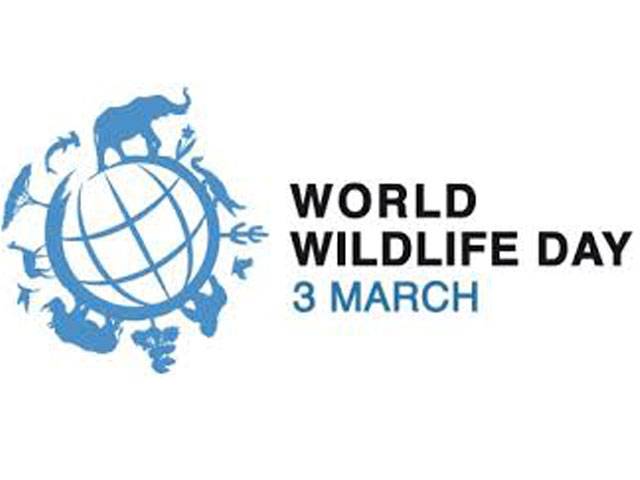ISLAMABAD - World Wildlife Conservation Day was celebrated at Pakistan Museum of Natural History on Monday.
Prof Dr Qasim Jan, ex-vice chancellor Qauid-e-Azam University and Advisor COMSTECH, was the chief guest on this occasion. The event was jointly organised by Ministry of Science and Technology (MoST), Pakistan Science Foundation (PSF), Pakistan Museum of Natural History (PMNH), US Embassy Islamabad, and Snow Leopard Foundation (SLF).
Peter Brennan, Minister Counsellor for Public Affairs, United States Embassy, Syed Mahmood Nasir, IG Forests, Muhammad Akhter Javed, Director General PMNH, Dr Muhammad Ali Nawaz, Director SLF, Abdul Majeed, English Programme Manager US Embassy, and Dr Muhammad Rafique, Director Zoological Sciences Division, PMNH were also present on this occasion.
Dr Qasim Jan said due to anthropogenic activities, wildlife populations have declined dramatically in Pakistan for the last three to four decades, as natural habitats are continuously being fragmented and degraded. It is feared that Pakistan is experiencing the world's second highest rate of deforestation and the country is losing its rangelands, forests, freshwaters and marine ecosystems at an alarming rate, he maintained. It is also facing the menace of climate change, uncontrolled emission of greenhouse gases, pollution, increase in human population, urbanisation, unsustainable agricultural practices, encroachments, hunting, poaching, introduction of exotic species and weak implementation of wildlife rules and regulations. "As a result of all these malpractices, we are facing a decline in numerous native species of plants and animals. A number of them are already extinct and many are listed as threatened in Pakistan," the chief guest said.
He said the changes happening in land and sea not only impact other species, they are impacting our own lives. "We rely on these species and ecosystems for our own livelihoods and well being. Our own population has reached seven billion people. Seven billion people who rely on food, water and energy for their daily lives, and a legitimate aspiration of better livelihoods for them and their children," he said.
"It is also fact that more than 50 per cent of human population live in cities. We are an increasingly urban species, and this presents new challenges and opportunities. Increasingly, large cities rely on other parts of the world to provide the food, water and energy used by millions of people. Big cities of the world are having an impact on species and ecosystems across the planet," he said.
He said, "We have many challenges to face and many questions to ask to ourselves regarding emerging environmental issues. We have to think as how will we increase food production by 50 per cent over the next 50 years? How can we reduce the emissions of CO2 without hampering industry and economic growth? How can we reduce the impact of invasive species that are moving around in an increasingly globalised world? How can we create effective governance mechanisms and greater awareness about the link between people and nature? How can we leverage new technologies to improve the exchange of information for conservation? How can we protect the species and ecosystems to make sure they are around for future generations? These are the questions and challenges that we need to address while we get together in these kinds of functions," he added.
Muhammad Akhter Javed Director General, PMNH, read message of PSF Chairman Prof Dr Khalil Ahmed Ibupoto. Dr Ibupoto in his message said, "In spite of uncountable services provided by wildlife to mankind, surprisingly it is the man itself who is responsible for destroying wildlife and its natural habitats.
The world's wildlife has declined by nearly a third over the past 40 years.
Almost 90 percent of all large fishes have disappeared from the world's oceans in the past half century. Lion populations have fallen by almost 90% in the past 20 years, leaving the animal close to extinction. There are now only 23,000 left, compared to an estimated 200,000 two decades ago. Almost a quarter of the world's mammals face extinction within 30 years."
Peter Brennan talked on animal trafficking and US efforts to control it. He said, "Future of your country depends on future of your animals and plants." He also threw light on English Access programme in Pakistan which has 4,500 students spread across 19 sites in almost every province of Pakistan.
The other speakers also threw light on importance of wildlife conservation and through presentations highlighted national animal, plant, flower, amphibian and reptile and fish etc. They also spoke on endangered and critically endangered species of Pakistan.
The winners of a poster competition titled "Why conserving wildlife in my community is important" were also awarded on this occasion. The winner students through presentations spoke on the concepts of their posters.
Saturday, April 20, 2024
Life goes Wild for a Day

Caption: Life goes Wild for a Day
Azam Khan ruled out of New Zealand T20Is
8:34 PM | April 20, 2024
Woman's body found in Islamabad
8:33 PM | April 20, 2024
Federal Cabinet lifts age bar for important appointments
8:31 PM | April 20, 2024
Balochistan to procure 500,000 metric tonnes of wheat, decides cabinet
8:30 PM | April 20, 2024
PM Shehbaz to undertake China visit in May to fast-track CPEC projects, says Mashhood
8:29 PM | April 20, 2024
Policitising Tragedy
April 20, 2024
Tehran to Rafah
April 20, 2024
A New Leaf
April 20, 2024
A Tense Neighbourhood
April 19, 2024
Dubai Underwater
April 19, 2024
Dangers of Deepfakes
April 20, 2024
Feudalism
April 20, 2024
Kite tragedy
April 19, 2024
Discipline dilemma
April 19, 2024
Urgent plea
April 19, 2024
ePaper - Nawaiwaqt
Advertisement
Nawaiwaqt Group | Copyright © 2024





